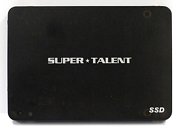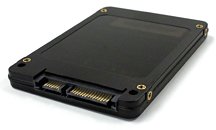Friday, April 9th 2010
Super Talent Introduces Value SSD Product Line
Super Talent Technology, a leading manufacturer of Flash storage solutions and DRAM memory modules, today announced a new value solid state drive (SSD) product line dubbed Super Talent VSSD that brings performance and solid-state technology together at an incredible price.
Super Talent VSSD offers shorter OS bootup time, faster application loading, less system power consumption and a brand new experience the customer can never get from traditional hard-disks. VSSD takes full advantage of the 3Gbps SATA-II bandwidth. The VSSD is capable of sequential read speeds up to 150 MB/sec and sequential write speeds up to 100 MB/sec.Available in capacities from 8GB to 64GB, Super Talent provides customers the option to enter the SSD world with a limited budget, but no compromise in performance. Customers can now build or upgrade a system economically, running the operating system and applications on the VSSD and storing data on a traditional hard-disk.
VSSDs have undergone exhaustive validation and stress testing in both Windows and Linux environments to emerge as one of the most reliable SSDs available. These drives are encased in a lightweight polymer shell that protects the drives against physical damage. VSSDs are dramatically more resistant to shock and vibration than hard drives.
VSSDs are available now from Super Talent resellers worldwide at street prices ranging from about $65 for the 8GB model to around $175 for the 64GB model.
Super Talent VSSD offers shorter OS bootup time, faster application loading, less system power consumption and a brand new experience the customer can never get from traditional hard-disks. VSSD takes full advantage of the 3Gbps SATA-II bandwidth. The VSSD is capable of sequential read speeds up to 150 MB/sec and sequential write speeds up to 100 MB/sec.Available in capacities from 8GB to 64GB, Super Talent provides customers the option to enter the SSD world with a limited budget, but no compromise in performance. Customers can now build or upgrade a system economically, running the operating system and applications on the VSSD and storing data on a traditional hard-disk.
VSSDs have undergone exhaustive validation and stress testing in both Windows and Linux environments to emerge as one of the most reliable SSDs available. These drives are encased in a lightweight polymer shell that protects the drives against physical damage. VSSDs are dramatically more resistant to shock and vibration than hard drives.
VSSDs are available now from Super Talent resellers worldwide at street prices ranging from about $65 for the 8GB model to around $175 for the 64GB model.



10 Comments on Super Talent Introduces Value SSD Product Line
That is not that much faster than the current gen of HDD's. I can get a 500 GB HDD that will give me about 110 MB/s sustained reads, and 88 MB/s writes. For $75 instead of $175. Or I can get 2 of those drives, go RAID 0 and boost performance beyond these value SSD's, or even RAID 1 and just get the boost in read performance with data redundancy for protection. Either of which are better options that are cheaper.
This just further proves SSD's are still too expensive.
Edit: Tested my Sammy 1 TB, sustained read is 131 MB/s on average and write is 92 MB/s average.
The question is what one cares about. My first Indilinx drive in my desktop worked with the Win 7 beta and was stellar. Then I got lucky to get X25-M G2 at launch day at Newegg for $250. I knew what to expect, and I was a little affraid the write speed is lower than the Indylinx. However nothing in life is sequential. Small file random performance is the real value of SSD. The random performance of the Intel is simply amazing. The multithreded performance is :respect:
Virtual machines love SSD, Photoshop loves SSD, Firefox loves SSD. Responsiveness is what I paid for. The difference between access times is nearly 100 times. Not 10%. Not 10 times. A 100 times. When you get used to SSD, you will notice everyone's desktops and laptops are moving so much slower.
The laptop in question is x60 tablet, made in 2006, has SATA1 controller and limits the Intel X25-M to 130 MB/s read. However it kills my i7 with Raptor with almost everything I do. And it goes to sleep and wakes up in 2-3 seconds.
I never regretted the SSD purchases. Especially the Intel since shock-proof and low power is added benefit for the laptop. Just this weekend Fry's had sale on 2TB Seagates for $129. I could care less how it performs - it's a 5900 rpm and it goes in a server. It's scary to think I could have 4TB for the same price of 80GB, but of I had to decide again I will still get a SSD.
I'm hopeful Intel will have the 25nm process drives around November for half-price (same like last year's launch). 160GB for $250 is going to be my next one.